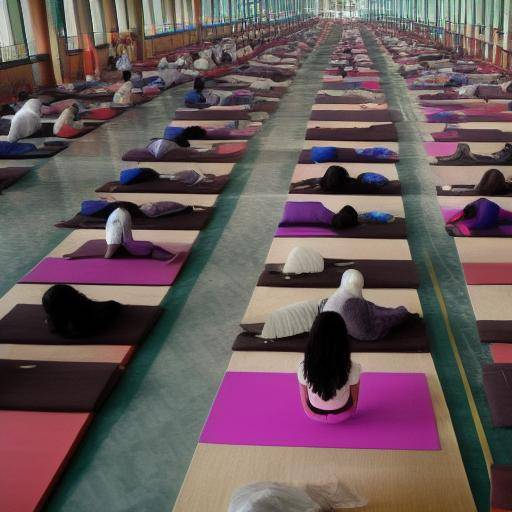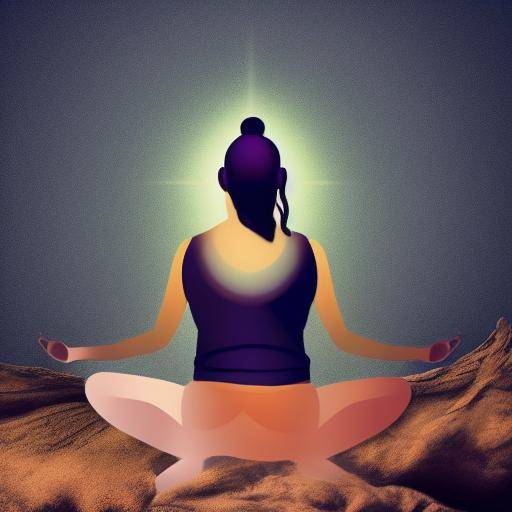
Meditation is a millennial practice that has transcended cultures and continents, and its impact on stress reduction and anxiety is undeniable. In this article, we will explore in depth how meditation can be an effective tool to combat stress, improve mental health and promote general well-being. From its historical origin to its practical application in modern life, this article will offer an integral view of the benefits and opportunities that meditation provides.
History and Background
Meditation has its roots in ancient oriental traditions, such as Buddhism and Hinduism, where it was practiced as a path to spiritual enlightenment. As these practices spread throughout the world, meditation became a global phenomenon, adopted by people from all cultures in search of inner peace and mental clarity. From monks in monasteries to executives in companies, meditation has shown its versatility and relevance over the centuries.
In the 1960s, meditation experienced a renewed interest in the West with the arrival of spiritual teachers such as Maharishi Mahesh Yogi, who introduced Transcendental Meditation. This was a turning point that led meditation to a wider audience, generating a growing interest in their mental and emotional health benefits. Over the years, meditation has evolved, adopting different approaches and techniques that have adapted to the needs of modern society.
Analysis in Deep
Numerous scientific studies support the benefits of meditation in reducing stress and anxiety. Regular practice of meditation has been associated with decreased levels of cortisol, stress hormone, and improved functioning of the immune system. It has also been shown that meditation reduces the activation of amygdala, the region of the brain associated with responses to fear and stress.
In the context of mental health, meditation has been recognized as an effective tool in treating anxiety disorders, depression and post-traumatic stress disorders. In addition, it has been shown that meditation promotes emotional resilience, full attention and self-regulation, fundamental skills to face the challenges of everyday life.
Comprehensive review
Meditation is not a homogeneous practice, but encompasses a wide range of approaches and techniques. From mindfulness meditation to guided meditation, each modality offers a unique approach to cultivating inner attention and calm. The choice of the meditation technique depends to a large extent on individual preferences and the specific objectives of each person.
In addition, meditation is not only limited to solitary practice; it is increasingly integrated into clinical, educational and labour environments as a tool to improve the well-being of people. Meditation programmes in companies, schools and health centres have proved effective in reducing stress and promoting an environment conducive to personal and professional growth.
Comparative analysis
Compared to other stress-reduction practices, such as physical exercise or relaxation techniques, meditation emphasizes by its focus on the development of consciousness and understanding of mental processes. While physical exercise can relieve stress through the release of endorphins, meditation offers a way to address stress at its root, creating a fundamental change in the person's relationship with his thoughts and emotions.
Practical Tips and Accessible Tips
If you are interested in incorporating meditation into your daily life, here are some practical tips to start:
- Find a quiet and comfortable place to meditate, where you can sit or lie down without interruption.
- Set a regular schedule for meditation, preferably in the morning or at night, when you can spend time connecting with yourself.
- Start with short meditation sessions, about 5 to 10 minutes, and gradually increase the duration as you feel more comfortable.
- Use resources such as guided meditation applications or relaxing music to help you focus during meditation.
- Keep an attitude of openness and patience towards the practice of meditation, recognizing that the benefits accumulate with time and consistency.
Industry Perspectives and Expert Reviews
Experts in the field of psychology, mental health and neuroscience have supported meditation as an effective practice in reducing stress and improving emotional well-being. Dr. Sara Lazar, a neuroscientist at Harvard School of Medicine, has conducted pioneering studies that show how meditation can cause positive changes in the structure of the brain, strengthening regions associated with emotional control and attention.
Similarly, Dr. Jon Kabat-Zinn, pioneer in incorporating mindfulness meditation into clinical environments, has argued that meditation can be a powerful tool to cultivate resilience and responsiveness to the challenges of life.
Case Studies and Applications in Real Life
In business, companies such as Google, Apple and Nike have implemented meditation programs for their employees with promising results in reducing labour stress and increasing productivity. In schools and universities, meditation has been integrated into educational programs to help students manage academic stress and improve their emotional well-being.
Future Trends and Predictions
As awareness of the importance of mental well-being continues to grow, meditation is expected to play an increasingly significant role in promoting emotional health and managing stress in modern society. With advances in technology, such as meditation applications and biofeedback devices, meditation is becoming increasingly accessible to a wider audience, which could generate a significant impact on global mental health.
Conclusion
Meditation is a powerful practice that offers tangible benefits in reducing stress, anxiety and promoting mental well-being. Throughout history, it has demonstrated its ability to build mental clarity, inner calm and greater emotional resilience. By incorporating meditation into your daily routine, you can cultivate a more calm and balanced mind, improving your quality of life significantly.
Frequently asked questions
1. How long should I meditate to experience significant benefits in stress reduction?
The duration of meditation may vary according to individual preferences, but it has been observed that sessions of at least 10 to 15 minutes a day can generate significant benefits in stress reduction.
2. What kind of meditation is more effective for stress reduction?
The effectiveness of meditation varies according to the person, but mindfulness meditation and breathing-based meditation are popular approaches to reducing stress and promoting inner calm.
3. Is it the right meditation for all people, regardless of their age or physical condition?
Meditation can be adapted to be accessible to people of all ages and levels of physical condition. Meditation techniques adapted for children, older adults, people with disabilities and various medical conditions have been developed.
4. Can I practice meditation if I have difficulties concentrating or if my mind is usually very agitated?
Meditation can be beneficial even for those who experience difficulties in concentrating or calming the mind. Meditation practice can help train attention and cultivate mental calm over time, although at first it can be challenging.
5. Does meditation require specialized training or can I learn on my own?
While the guide of an experienced instructor can be useful, there are numerous online resources, such as meditation applications and guided meditation videos, which can provide guidance for those who wish to learn to meditate on themselves.
6. Can meditation have negative effects on some people?
While meditation is generally considered safe, some people may experience intense emotions or disconcerting sensations during meditation, especially at first. It is important to practice meditation in moderation and seek professional guidance if concerns arise.
In short, meditation is a powerful tool for reducing stress and promoting mental well-being. By understanding its benefits and adopting it as a regular practice, you can cultivate greater tranquility, mental clarity and emotional resilience in your daily life.






















































